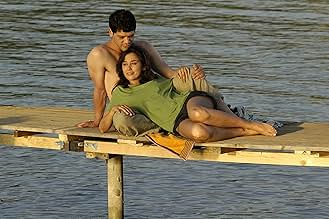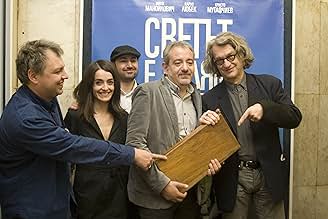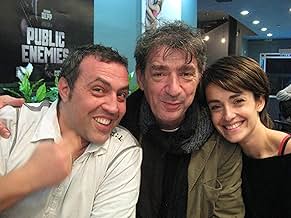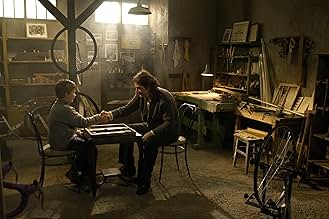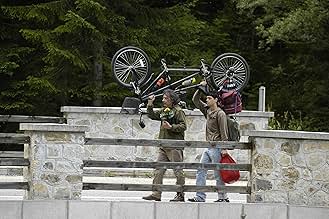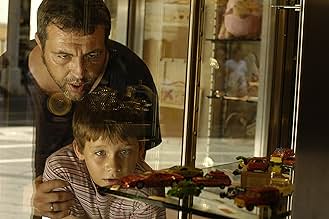Svetat e golyam i spasenie debne otvsyakade
- 2008
- 1h 45min
Aggiungi una trama nella tua linguaThe story of Alex, who, with the help of his charismatic grandfather, Bai Dan, embarks on a journey in search of his real self.The story of Alex, who, with the help of his charismatic grandfather, Bai Dan, embarks on a journey in search of his real self.The story of Alex, who, with the help of his charismatic grandfather, Bai Dan, embarks on a journey in search of his real self.
- Regia
- Sceneggiatura
- Star
- Premi
- 10 vittorie e 10 candidature totali
- Bai Dan
- (as Miki Manojlovic)
- Dr. Schreiber
- (as Heinz Josef Braun)
- Cafe owner
- (as Pavel Popandov)
- Marta
- (as Anna Napsugár Forgó)
Recensioni in evidenza
This film may not be a master piece but it definitely has emotional value for Eastern Europeans who have experienced the Communist Regime! It describes the life and the people back then adequately and all facts represent true stories from people's lives! Actors emotions and reactions in the film are very close to what one Bulgarian would say or do so I find the film very realistic and definitely the best productions made by Bulgarians after 1989.
Based on my personal experience, I think the movie contained quite a few overstatements of facts like the people staying in the camp 3-4 years while their documents were being processed, or the somewhat overstated communist reality in Bulgaria at the time. Among these exaggerations, there were quite a few things that were very accurate however. For example immigrants (profugas) were pretty much fed pasta - most of the time without any sauce - while the UN paid something like $50 per day per immigrant to the camp. This amount would have enabled us to live much better had it been given directly to us.
Thinking about these exaggerations, I am somewhat ready to forgive the makers for resorting to them, since they did amplify the ideas that were being conveyed. Emotions such as the paralyzing fear of the uncertainty ahead that gnawed at every immigrant's soul aren't easily expressed without relying on parable to some degree. Perhaps a more seasoned film maker would have toned things down, but likely not.
I did find a few somewhat pointless episodes like the love scene with the singer, which did nothing for me other than sweeten the happy end. Also I think the movie would have been better served if the Sashko's past hadn't been erased through the use of a somewhat brutally cliché device like the car crash, but through a more psychological one like the dissolution of his parents' marriage or such.
All in all - as other reviewers have posted - although the movie has a number of clichés, it uses them constructively. Rather than deafening or turning off the viewer, the clichés tend to amplify the message to a level that it becomes clearer.
Basically the movie works.
If this were a Hollywood film, I'm pretty certain it would be awful. There are elements in this film that are clichés - but this is where powerful film-making comes into play; you can exploit a cliché in such a way so as to make it a staggeringly original statement.
And even if many times for many of us, it doesn't really seem as though the world is big salvation lurks around the corner, this movie effortlessly makes you believe it does, and that's enough of a reason to watch it.
Things I didn't like: the one-sided densely evil picture of the totalitarian oppressors that rendered them preposterously inhuman, the clichéd camera (e.g. yellowish retrospectives, rotation around characters while they played backgammon) and superfluous didacticism in some scenes.
All in all it's worth watching, but eight years of script rewriting could yield a bit better result.
This movie was the Bulgaria's official entry into Academy Awards 2009 and it was also shown in many film festivals winning many awards.
I simply loved this movie. With a wonderful and simple story this movie captivates the viewer with the brilliant acting by Miki Mnojlovic and his inducing dialogues. Stephen Komandarev is a wonderful director who knows how to visualize a story. But the story rises above all these and makes the movie a definite must watch.
The movie tells the story of the journey of Bai Dan and his Grandson Alex in search of the real self of the latter. In a parallel story line we witness the plight of the young Alex and his parents for a new life from Bulgaria to Germany. Both the stories go well simultaneously and do not make the viewer bored. This is because of an intelligent and well written screenplay.
I really liked the characterization of Bai Dan, an experienced man whose life is all about the game Backgammon and even his dialogues relate around the game. He once says to his grandson "life is like the dice in our hand, fate is determined by the skill and luck of the player." He has a simple solution to all problems. He never pushes Alex to revoke his old self but with his own innovative techniques he tries to get back his old Alex. He realizes that sitting idly in the hospital can never make Alex any better and he takes him on a cross country trip across Europe and playing Backgammon occasionally.
But this is more than a tale of two people on the road to self-realism. The movie explores into the political situation of Bulgaria during the 1980s. Alex' father, Vasko, gets into trouble with a local communist who wants him to spy on Bai Dan, his father-in-law. He refuses and worrying about the consequences he decides to leave Bulgaria and flee to Germany with his wife and son. We get to see the troubles that they face during their migration and the problems they and the other immigrants from different countries face in the refugee camp.
Backgammon had been given much importance throughout the movie. The movie starts with backgammon and ends with backgammon. Bai Dan's life revolves around backgammon. In Vasko's life also backgammon plays an important part. The game plays also an important role in bringing Alex back into his original life.
The movie talks about the hopes of a small family and their dreams of having a better life somewhere. It tells the forgotten memories, dreams and life of a young man who learns more things when he regains his memories. It tells about a grandfather with full of love for his grandson. It tells how a small game like backgammon can stir the life of people.
I strongly recommend this movie to everyone for the brilliant acting of Mr. Manojlovic, an interesting story, good direction. At the end, everyone wishes for a grandfather like Bai Dan and that's the success of this movie.
~ dillitalkies.blogspot.com ~
Lo sapevi?
- QuizBulgaria's official submission to 82nd Academy Award's Foreign Language in 2010. Made the shortlist of 9 films.
- BlooperIt's very unlikely that both cables to brake the bike would break away at once.
- Citazioni
Bai Dan: I'm your Grandpa, from Bulgaria. Don't you recognize me? Are you all right? Tell me you are!
Alexander 'Sashko' Georgiev: I don't know if... Please, I... I don't know you...
Bai Dan: Sashe, Sashe... Have a good look. It's me, your Grandpa! I came from home. Remember? I taught you to play backgammon. You remember the song? Backgammon's played by those who can / Backgammon's played by those who can't, too.
- ConnessioniReferenced in Estrenos Críticos: Harry Potter y las Pelis que no conocía ni Dios (2011)
I più visti
- How long is The World is Big and Salvation Lurks Around the Corner?Powered by Alexa
Dettagli
- Data di uscita
- Paesi di origine
- Siti ufficiali
- Lingue
- Celebre anche come
- The World is Big and Salvation Lurks Around the Corner
- Luoghi delle riprese
- Aziende produttrici
- Vedi altri crediti dell’azienda su IMDbPro
Botteghino
- Lordo in tutto il mondo
- 291.275 USD
- Tempo di esecuzione1 ora 45 minuti
- Colore
- Proporzioni
- 1.66 : 1
- 1.85 : 1
Contribuisci a questa pagina


